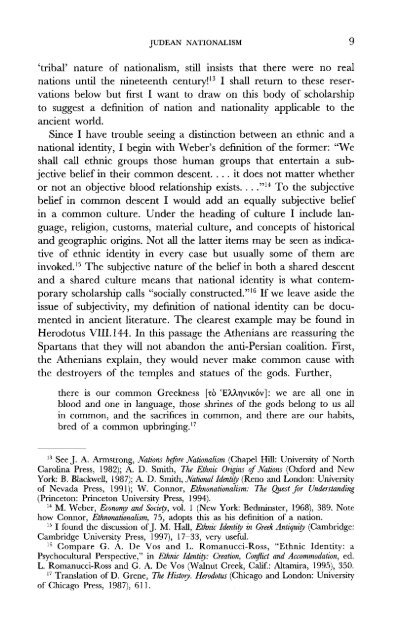historical perspectives: from the hasmoneans to bar kokhba in light ...
historical perspectives: from the hasmoneans to bar kokhba in light ...
historical perspectives: from the hasmoneans to bar kokhba in light ...
You also want an ePaper? Increase the reach of your titles
YUMPU automatically turns print PDFs into web optimized ePapers that Google loves.
JUDEAN NATIONALISM 9<br />
'tribal' nature of nationalism, still <strong>in</strong>sists that <strong>the</strong>re were no real<br />
nations until <strong>the</strong> n<strong>in</strong>eteenth century! 13 I shall return <strong>to</strong> <strong>the</strong>se reservations<br />
below but first I want <strong>to</strong> draw on this body of scholarship<br />
<strong>to</strong> suggest a def<strong>in</strong>ition of nation and nationality applicable <strong>to</strong> <strong>the</strong><br />
ancient world.<br />
S<strong>in</strong>ce I have trouble see<strong>in</strong>g a dist<strong>in</strong>ction between an ethnic and a<br />
national identity, I beg<strong>in</strong> with Weber's def<strong>in</strong>ition of <strong>the</strong> former: "We<br />
shall call ethnic groups those human groups that enterta<strong>in</strong> a subjective<br />
belief <strong>in</strong> <strong>the</strong>ir common descent. ... it does not matter whe<strong>the</strong>r<br />
or not an objective blood relationship exists. . . ." 14 To <strong>the</strong> subjective<br />
belief <strong>in</strong> common descent I would add an equally subjective belief<br />
<strong>in</strong> a common culture. Under <strong>the</strong> head<strong>in</strong>g of culture I <strong>in</strong>clude language,<br />
religion, cus<strong>to</strong>ms, material culture, and concepts of <strong>his<strong>to</strong>rical</strong><br />
and geographic orig<strong>in</strong>s. Not all <strong>the</strong> latter items may be seen as <strong>in</strong>dicative<br />
of ethnic identity <strong>in</strong> every case but usually some of <strong>the</strong>m are<br />
<strong>in</strong>voked. 15 The subjective nature of <strong>the</strong> belief <strong>in</strong> both a shared descent<br />
and a shared culture means that national identity is what contemporary<br />
scholarship calls "socially constructed." 16 If we leave aside <strong>the</strong><br />
issue of subjectivity, my def<strong>in</strong>ition of national identity can be documented<br />
<strong>in</strong> ancient literature. The clearest example may be found <strong>in</strong><br />
Herodotus VIII. 144. In this passage <strong>the</strong> A<strong>the</strong>nians are reassur<strong>in</strong>g <strong>the</strong><br />
Spartans that <strong>the</strong>y will not abandon <strong>the</strong> anti-Persian coalition. First,<br />
<strong>the</strong> A<strong>the</strong>nians expla<strong>in</strong>, <strong>the</strong>y would never make common cause with<br />
<strong>the</strong> destroyers of <strong>the</strong> temples and statues of <strong>the</strong> gods. Fur<strong>the</strong>r,<br />
<strong>the</strong>re is our common Greekness [TO 'E ]: we are all one <strong>in</strong><br />
blood and one <strong>in</strong> language, those shr<strong>in</strong>es of <strong>the</strong> gods belong <strong>to</strong> us all<br />
<strong>in</strong> common, and <strong>the</strong> sacrifices <strong>in</strong> common, and <strong>the</strong>re are our habits,<br />
bred of a common upbr<strong>in</strong>g<strong>in</strong>g. 17<br />
13 See J. A. Armstrong, Nations before Nationalism (Chapel Hill: University of North<br />
Carol<strong>in</strong>a Press, 1982); A. D. Smith, The Ethnic Orig<strong>in</strong>s of Nations (Oxford and New<br />
York: B. Blackwell, 1987); A. D. Smith, National Identity (Reno and London: University<br />
of Nevada Press, 1991); W. Connor, Ethnonationalism: The Quest for Understand<strong>in</strong>g<br />
(Pr<strong>in</strong>ce<strong>to</strong>n: Pr<strong>in</strong>ce<strong>to</strong>n University Press, 1994).<br />
14 M. Weber, Economy and Society, vol. 1 (New York: Bedm<strong>in</strong>ster, 1968), 389. Note<br />
how Connor, Ethnonationalism, 75, adopts this as his def<strong>in</strong>ition of a nation.<br />
15 I found <strong>the</strong> discussion of J. M. Hall, Ethnic Identity <strong>in</strong> Greek Antiquity (Cambridge:<br />
Cambridge University Press, 1997), 17-33, very useful.<br />
16 Compare G. A. De Vos and L. Romanucci-Ross, "Ethnic Identity: a<br />
Psychocultural Perspective," <strong>in</strong> Ethnic Identity: Creation, Conflict and Accommodation, ed.<br />
L. Romanucci-Ross and G. A. De Vos (Walnut Creek, Calif.: Altamira, 1995), 350.<br />
17 Translation of D. Grene, The His<strong>to</strong>ry. Herodotus (Chicago and London: University<br />
of Chicago Press, 1987), 611.

















